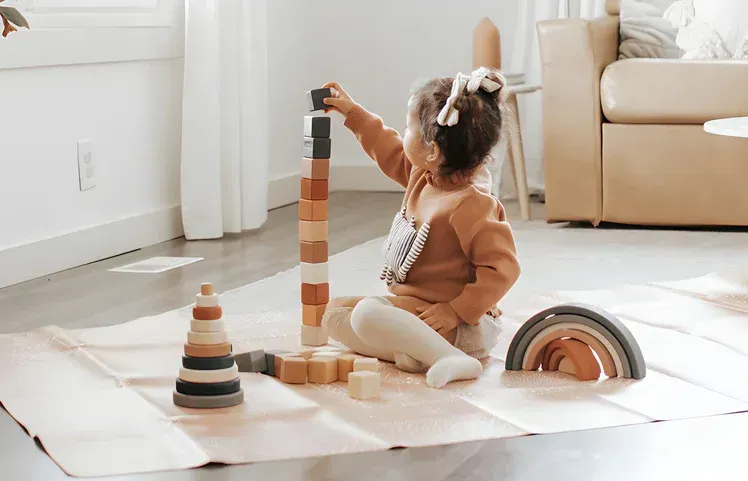
A Gift Is Personal
Thanksgiving marks the beginning of the holiday season for many religious and cultures. As the holidays approach, so does the time to buy gifts for loved ones. This can be a challenge for the intentional parent, who wants to give thoughtful purchases that will inspire engagement and support development, while also not adding to the clutter in your home!
If we turn to the essential observations that Dr. Maria Montessori made about children, we can use these as a guide to consider what is most useful to give. By viewing children in their planes and sub-planes of development, we see what their needs and interests are at these times, and can choose appealing and developmentally supportive toys, activities and tools for each age.
Infants and Toddlers: 0-3 Years
Perhaps there is no greater leap in development that a human being will make in their entire lives than the changes that occur from birth to age three. The tiny helpless infant becomes an independent and functioning three year old! During this stage of life, parents and caregivers want to particularly support the child's development of their fine and gross motor skills.
Basket of Balls: Choose a variety of three or four balls (3-6 inches in diameter) and put them in a basket just large enough to hold them. The balls can be made of different materials, and have different colors. An infant will reach towards and eventually scoot towards a ball placed in front of them. A crawling baby will chase after the rolling balls. A toddler will practice throwing and kicking the balls outside or in a recreation area.
Set of Wood Blocks: A baby who is sitting can practice putting one block on top of the other. As they develop this skill and interest, they can do this work with more and more blocks. By the time they are three, they will build even more complex structures.
Small Apron and Chef's Hat: One of a toddler's favorite places is in the kitchen! With the appropriate gear, you can signal to them that they are invited to participate in the work of the home. There are a variety of one and two step activities that toddlers can do in the kitchen. A gift such as this one allows them to feel that their efforts and contributions are recognized as important.
The Young Child: 3-6 Years
While a child spends the first three years of their lives developing their movement, they spend the next three years practicing refinement of these acquisitions. They also are now becoming more curious about what is in the world around them. At this age, gifts that allow them to work with their newly acquired fine movement skills and gifts that give them facts about the world are appreciated.
Color Pencil Set: A beautiful set of colored pencils with a special drawing pad make a wonderful gift. Children love having a designated case for their pencils and a specific booklet for storing their pictures. A gift like that elevates their activity and gives it dignity!
Kitchen Set: For this gift, choose a small cutting board, a small strainer, and a crinkle cutter or wavy knife. A young child enjoys contributing to their home, and the kitchen is a wonderful place for their work. These child-sized tools allow them to participate in many food preparation activities.
Nature Guides: These are many nature guides that are appealing to young children - trees, leaves, flowers, insects, reptiles, amphibians, mammals and more. Search for ones that have a large clear picture of the subject, and the name clearly written out (perhaps with supplemental information as well.) At this age, children can best understand the books when they are simple and only have one picture per page.
For any stage of childhood, first consider what you know about a child's abilities and developmental needs. By keeping these mind, you are more likely to find a gift that will continue to appeal to them through this stage of their development. Secondly, it is important to pay attention to who your child is and what their unique interests are at the time. A gift reflects what you know about them and tells them that you see who they are and love them for it!


